The last time I had the chance to dive into the video game world of the Alien franchise – with Aliens: Fireteam Elite – I was left extremely disappointed. While we’ve had a string of not-so-great movies, there have been glimpses of hope for fans of the property with the likes of interactive titles such as Alien: Isolation, which shows that the right ideas and execution can produce something interesting.
With Aliens: Dark Descent, indie studio Tindalos Interactive has dropped the much-beloved horror series into the real-time strategy genre, which has left me wondering why this is only now happening. It seems like a perfect fit. Unfortunately, despite a promising premise, Aliens: Dark Descent is encapsulated by a disjointed gameplay loop that doesn’t quite know what it wants to be.
Aliens: Dark Descent Key Details
- Developer: Tindalos Interactive
- Platforms: PC, PS5, PS4, Xbox Series X/S, & Xbox One
- Release Date: June 20, 2023
- Price: $39.99
A Promising Start That Begins to Unwind
After the crew aboard the USS Otago have a run-in with Xenomorophs, the ship crash lands on the nearby planet of Lethe. Your team is tasked with exploring and collecting resources to repair the giant hunk of metal. However, the planet is quickly being infested with alien lifeforms, and as time goes on, your chances of survival dwindle.
You’re in command of a squad of Colonial Marines controlled as a unit. While the game automatically determines which character is best suited for the job you’ve assigned. Each team member is equipped with weapons to defend themselves and has the ability to use certain skills while spending Command Points. A good variety of these skills are at your disposal, ranging from laying down suppressing fire that can damage and slow down enemies, to deploying mines that trigger an explosion if something moves within its radius. When to spend these points is a key component to the game’s strategy because you don’t want to be left in the heat of a battle with no abilities at hand.
As you navigate the enormous levels in Aliens: Dark Descent, you’ll slowly explore rooms, collecting resources for your team to use, including ammo clips, medical supplies, and materials. Standing in your way, though, will be hordes of Xenomorphs, but never fear; you’ve got a badass squad of marines to take them on, right?
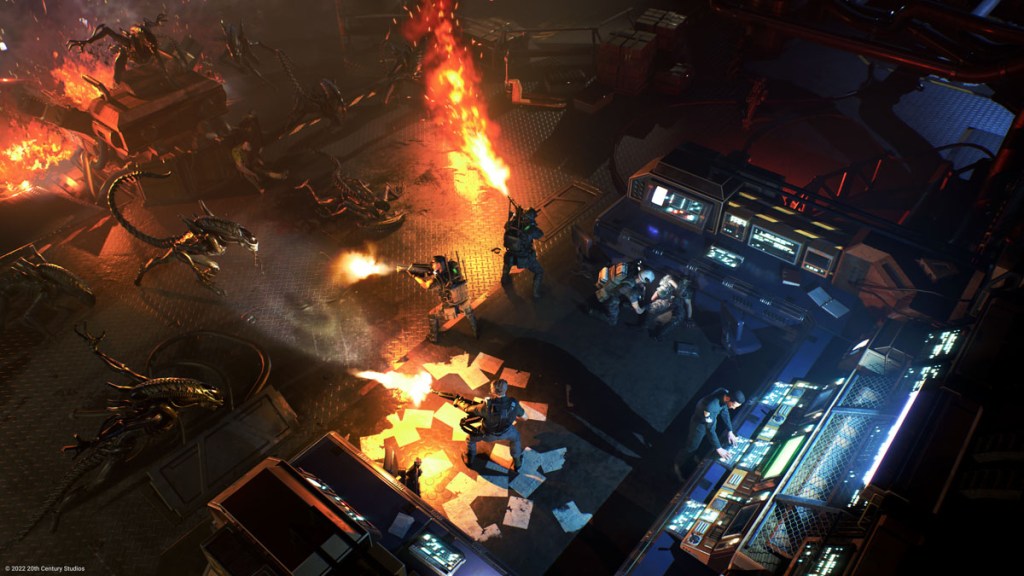
I Want to Fight Aliens, Not Run Away From Them
Early on, during one of the opening tutorial moments, you’ll be told that stealth is an important part of exploration because firing upon just one of these nasty aliens can alert the entire hive. When this happens, a timer starts, and other Xenomorphs will zone in on your position. During specific tiers on this timer, the aggressiveness of the Xenomorphs increase, and so your confrontations get harder.
My issue here is that I thought I was signing up for a game to mow down aliens, not spend my time trying to sneak through a deserted outpost. It doesn’t help that the entire stealth system is clunky, and because you don’t have any control over individual squad members, you’re sometimes left watching the AI run around and do things that put them in dangerous situations as you stare in bewilderment. This is important because death for your squad members is permanent, and one mistake can make a tremendous difference in how your game evolves.
You Can’t Make Mistakes With Permadeath
Precision is a huge factor in games that punish the player for making mistakes. FromSoftware has made a hugely successful genre off of this concept, but the gameplay in those titles (Dark Souls, Bloodborne, Elden Ring) is extremely tight, and when you die in combat, the majority of the time, it’s because of something you’ve done wrong. When that precision isn’t there – which is the case for Aliens: Dark Descent – and you keep seeing it happen, you feel cheated, and you’re constantly left wondering when this will occur again.
Aliens: Dark Descent has a habit of putting you in these situations. If not, when characters get stuck in the environment and are left behind, or when some other technical issue creeps in, it’s during one of the other dozens of times something happened out of left field, leaving me feeling ripped off. There are too many systems in Aliens: Dark Descent for my liking that slowed down or stopped me from trying to have fun.
If you get into a fight with a Xenomorph, you’re supposed to hide and wait around for them to stop hunting you. If you cross a threshold on the aggression meter, the hive will send a horde out, so you need to stop what you’re doing and bunker down for a fight. There were times when I found myself in almost impossible situations to resolve, purely because I was at a key checkpoint in the game, and the Xenomorph aggressiveness was lingering on the edge of the next tier.
On multiple occasions, I would reach the crescendo of the mission where a big battle was due to take place, only to find myself having the horde being sent at the same time, and periodically a mini-boss would spawn in the fight because this was a marker I’d reached in the aggression timer.
The game allows you to reset that timer, though, but it requires you to travel back to the APC extraction point and leave the mission. This is almost encouraged as you can return to the mission later – but it puts a big momentum stopper in what you’re doing as you spend minutes retracing your steps through a maze of hallways. Everything feels like it has come to a grinding halt.
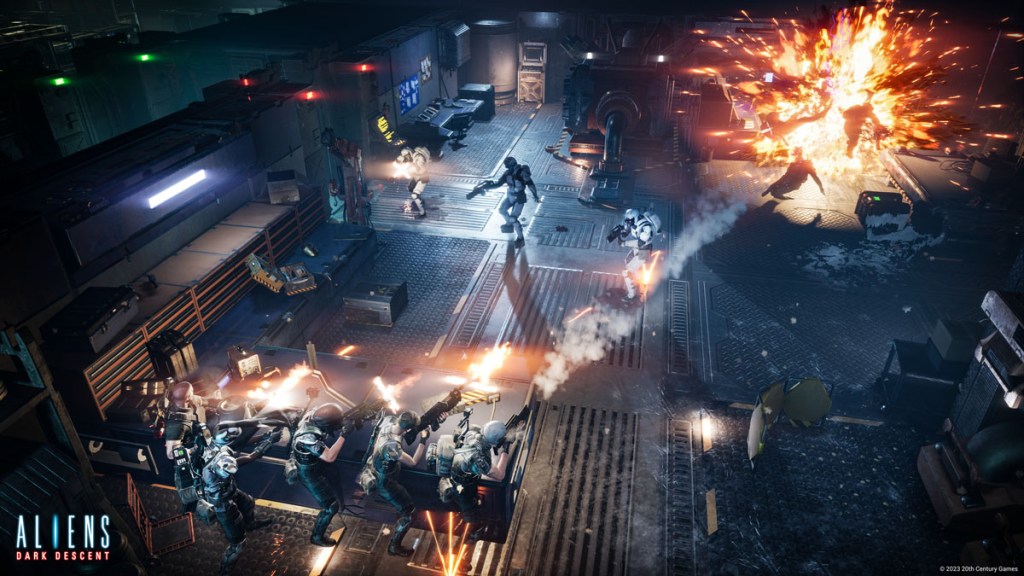
Taking Inspiration From XCOM
Back in the main base of the Otago, you’ll have to tend to your wounded marines, including their emotional distress levels. Aliens: Dark Descent has taken a lot of inspiration from Firaxis’ XCOM series here. As you progress, you’ll unlock new weapons, tools, and areas of the base to improve your squad. But as you’re making changes and deciding on whether your team is equipped to start or continue a mission, each day that passes increases the game’s difficulty. So although returning to the Otago to reset the aggression level is advised, you’re also kicking yourself in the teeth.
It’s very frustrating as there are moments where I was actively having fun and enjoyed the strategic elements of Aliens: Dark Descent, only to have that enjoyment shattered by a system that was constantly taking it away. I think if the aggression system was slowed down a bit, most of my grievances with the pacing would wane.
Even though I had problems with certain gameplay elements, the atmosphere that Aliens: Dark Descent delivers is great. The levels you explore are dense and can take hours to work through. Combining this with the equally satisfying iconic sounds that blast through your speakers and a solid music track helps add to the enjoyment of exploring in the missions. My one gripe here is that your squadmates never shut up and repeat the same lines repeatedly — an unfortunate stigma of the RTS genre, but one I wish you could turn off.
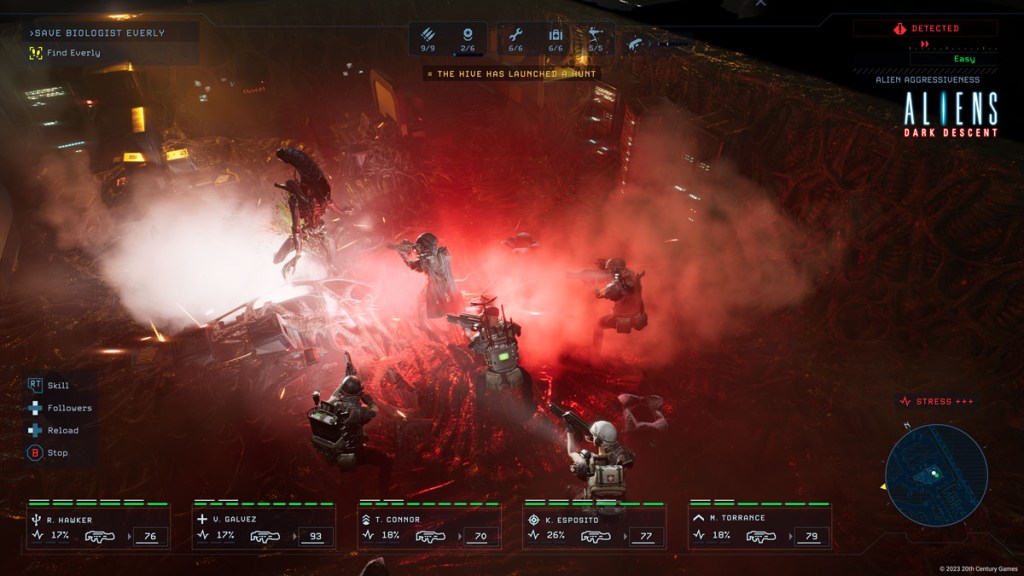
Verdict
Although I might seem down on Aliens: Dark Descent, there is a great game here under the inconvenience that is the main systems constantly getting in your way of trying to have fun. Balancing this out so scenarios aren’t piling on top of one another at the same time would definitely alleviate some of the frustrations I had being gated into outlandish fights. With a game where permadeath for characters is such a vital component, having bugs and technical issues that cause you to lose progress can be gut-wrenching, and it’s something I experienced far too often. Aliens: Dark Descent isn’t exactly what I had hoped for, but there’s plenty of room where improvements can be made.
Final Score:
6/ 10
| + | Big expansive areas to explore |
| + | Great atmosphere that does a decent job of capturing the Alien franchise aesthetic |
| – | Too many instances of the game coming to a grinding halt |
| – | Stealth mechanics are very limited |
| – | Technical problems can cause you to lose your squad |
Gamepur team received a PC code for the purpose of this review.

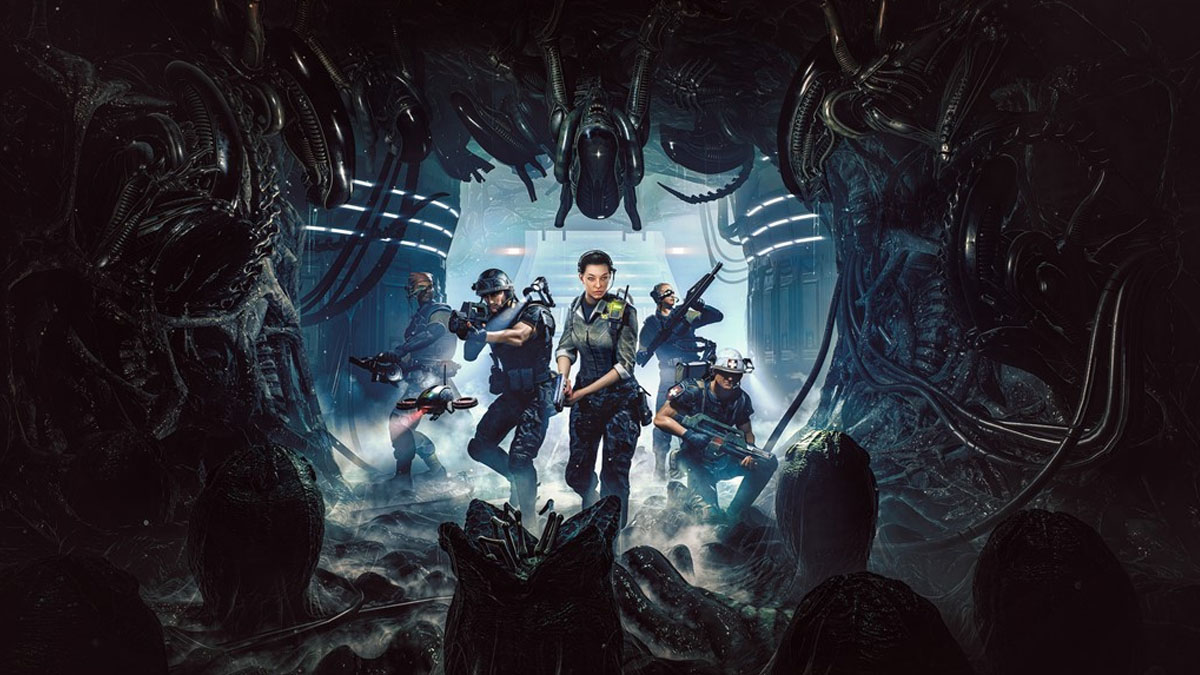
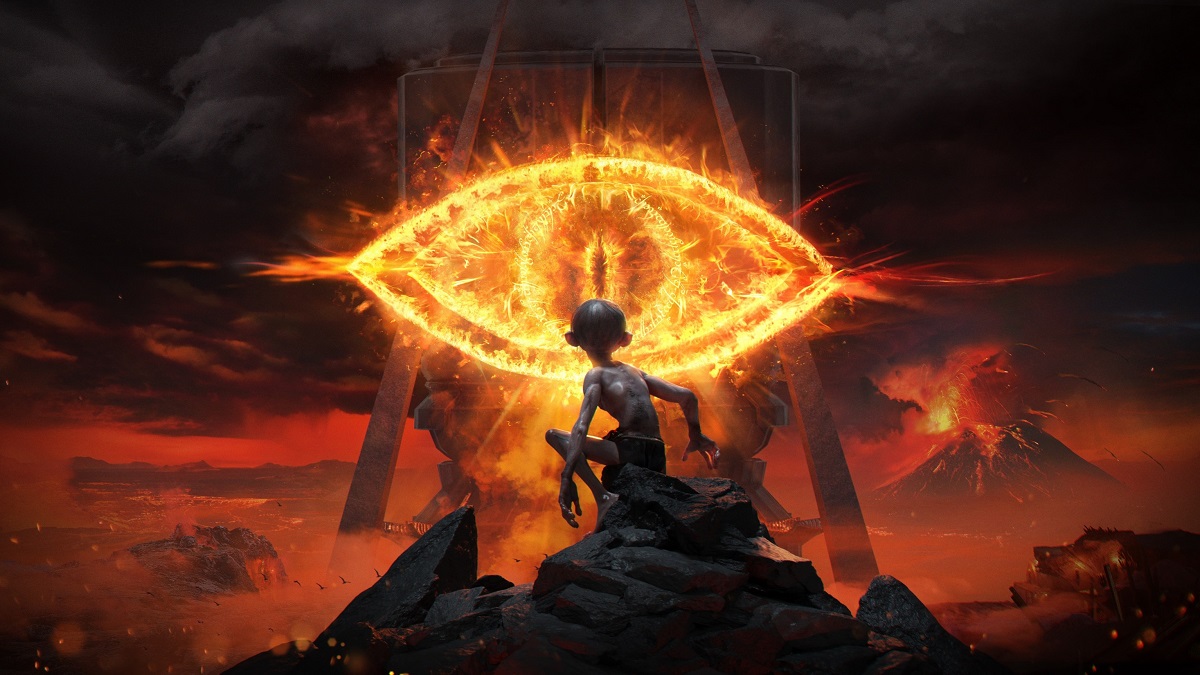
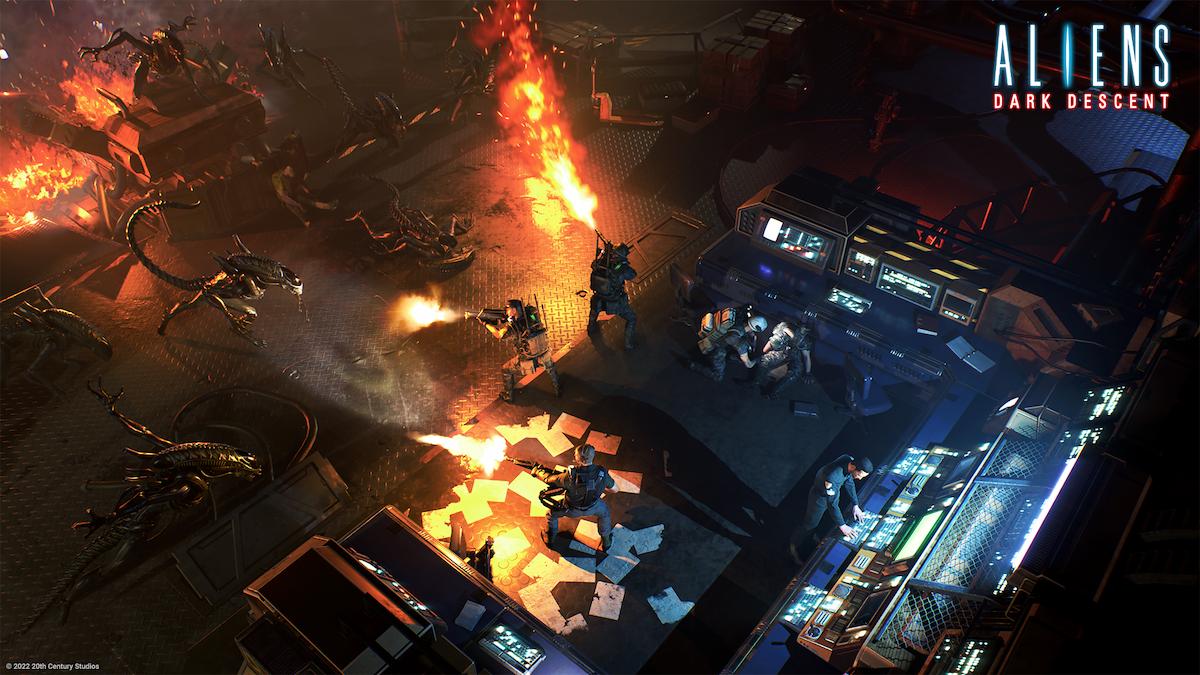
Published: Jun 22, 2023 09:38 pm